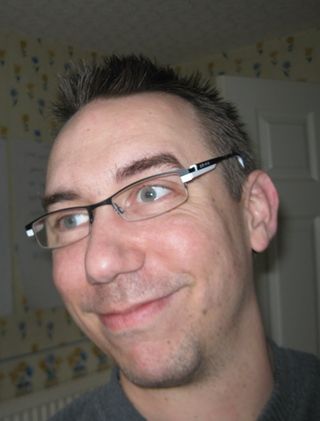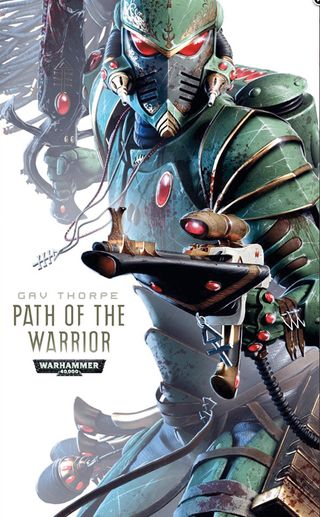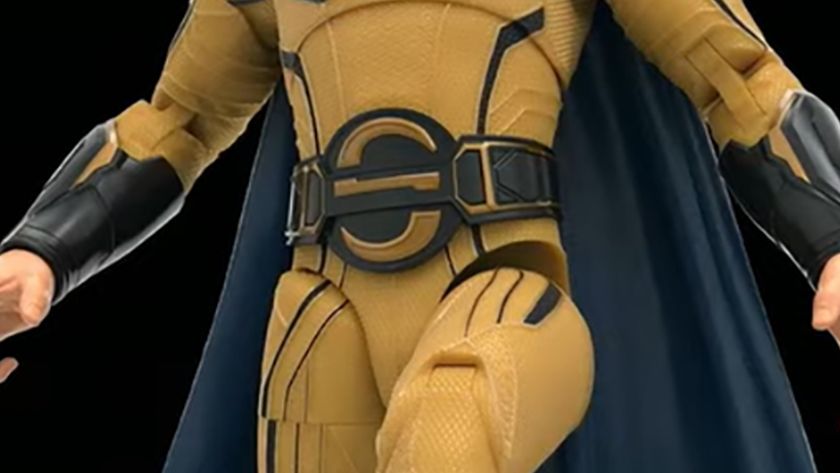Author Interview - Gav Thorpe
None
We go one on one with the science fiction and fantasy author


It’s Thursday so it must be time for the third in our weekly series of author interviews to celebrate the Summer Of SF Reading online and in SFX magazine. Over the past two weeks we’ve shared tea and biscuits with Dan Abnett and Graham McNeill , but this week we break bread with Gav Thorpe – author, gamer and all round Warhammer expert ahead of his latest release this summer – Path Of The Warrior .
.
SFX: Hi Gav. To start with would you mind telling me a little bit about yourself and how you got into a career as a writer, was this always your intention?
GT: Hello! I’m a homo sapiens of average proportion, aged in the mid-thirties. I’ve been writing short stories and novels for around 13 years, and three years ago I started doing that full-time.
I’ve been mixed up in sci-fi and fantasy stuff for as long as I can remember, but originally it was my intent to become an illustrator. After finishing my A levels I came to the realisation that to get as good as I would need to be would require another five years in education, which I didn’t fancy at all. I’d been writing alongside the painting and drawing, again heavily influenced by science fiction and fantasy, and I was lucky enough to get a break at Games Workshop.
Sign up to the SFX Newsletter
Get sneak previews, exclusive competitions and details of special events each month!
This meant that I was around for the creation of the Games Workshop’s imprint, the Black Library. Sitting about ten metres from Andy Jones’ desk, the guy who started Black Library, made it that much easier to move into full fiction writing! So, while I’ve never had an organised plan to end up where I am, I’ve seized the opportunities that have come my way to get here, and very fortunate I’ve been to do so.
SFX: You’re primarily known for your work in the Warhammer universe, what was the appeal of that world for you and what is it that has kept you writing there for more than a decade?
GT: Warhammer and Warhammer 40,000 have evolved with a purpose of inclusion, and are massively broad in scope. As well as tried and tested fantasy tropes like elves and dwarfs and orcs, each with their own spin, Warhammer has vampires and zombies, meso-American style Lizardmen, the mummy Tomb Kings and everything else besides; Warhammer 40,000 takes this a stage further and flings these images and concepts into a dystopian far future.
There’s a very British feel about Warhammer , and a strong sense of the mood of the late ’70s and early ’80s when a lot of the history and background was in its foetal stages. There’s a punk, heavy metal, cold war influence running through both universes that makes it grimmer and spikier than a lot of the fantasy and sci-fi worlds out there, especially from across the Atlantic. The humour is also an important part of the mix. The universes knowingly tip their hat to the tropes and archetypes they use, often subverting them and exaggerating along the way, while historical references and literary homage abound, plus the bad puns and occasional slapstick, all threaded together with a vein of very dark humour and irony.
SFX: Did you play table-top war games like Warhammer before you started working for the Black Library? If so was this a big part of your youth?
GT: I was, still am, a gaming geek. I love games of all sorts, be it miniatures, roleplaying, card games or computer games. My cousin first introduced me to Citadel miniatures and Warhammer around the age of ten, and around that time I also got involved in Dungeons And Dragons and other RPGs. I was fortunate to have the opportunity to turn that hobby and enthusiasm into a career, for which I’ve always been thankful.
SFX: What do you think gamers and readers find so attractive about Warhammer and Warhammer 40,000 in particular?
GT: There’s the freedom I just mentioned, but I think the strongest appeal is the unashamed use of identifiable and accessible archetypes. There is something for everyone, whatever ticks their box. Whether its elves and dragons, power armoured super soldiers, the poor bloody infantry, intergalactic alien swarms, shuffling zombie hordes, robotic killing machines, all of them find a place in Warhammer and 40K . The real trick is the subtle manipulation of these archetypes. When presented properly, the Warhammer and Warhammer 40,000 universes kick directly into the imagery and concepts that sci-fi and fantasy fans have grown up with, but given a subtle and sometimes not-so-subtle twist. The universes are both in their third decades of existence, and that leaves a depth and richness that can be explored – strong archetypes attract attention, the layers underlying them drawn people in further until they’re hooked.
SFX: You’re a freelance writer now but did you ever feel restricted writing exclusively for the Black Library and in the Warhammer universe? What opportunities has going freelance opened up for you?
GT: Well, the short stories and novels side of things was always done on a freelance basis, on top of the day job as a games developer. I’ve been in an advantaged position in comparison to many Black Library authors because I’ve had a foot in both camps, as a contributor in my spare time and one of the gatekeepers during work hours. It’s tricky for an editor to raise too many questions about the background when he or she is talking to one of the people that made those decisions on a day-to-day basis. I think this has left certain doors open for me, allowing me to explore parts of the Warhammer universes and themes within them that might not always be available to authors without that experience.
On the whole, I’ve never encountered a type of story I’ve wanted to tell and not been able to find some way to fit it into Warhammer and 40K . They are universes built on conflict, so any take on ambition, revenge, betrayal, heroism, fear or anything else you might want to write about can usually find a place, it’s just knowing the most appropriate part of the setting to use.
On the other hand, there is a lot of established material to be aware of, and certain rules and principles that need to be borne in mind. The simplest is that Black Library offers action-orientated fare, and the universes present a background of worlds constantly in the turmoil of war. There won’t be many Mills And Boon romances!
I’ve generally been quite dismissive of the emphasis placed on world-building in fantasy and sci-fi – often this seems to take precedence over good story-telling – but there is a great deal of satisfaction to be had from creating a setting from a blank page. There are no inherited odds and ends that might prove annoying, no past mistakes that you have to cope with.
SFX: What can you tell us about your first Angry Robot novel The Crown Of The Blood specifically and the trilogy it is part of more generally?
GT: The Crown Of The Blood is the name of both the first book and the trilogy. My basic pitch was something like, “a fantasy version of HBO’s Rome ”. It’s about power, intrigue and military politics, to determine the fate of a huge empire.
Knowing that I’m going to be writing plenty more Warhammer fiction in the years to come, I wanted to get as far away from that setting as possible to a space I could clearly identify as my own. That’s not just because of the Warhammer connection, there’re already far too many pseudo-medieval fantasy worlds out there already. I looked further back in history for inspiration, and as well as the machinations of Julius Caesar and his ilk, I found the sort of meaty reality I was looking for in the empire-building antics of Philip and Alexander of Macedon. In style this is a ballsy, modern fantasy, like 300 , which I imagine with a grinding guitar soundtrack by Tyler Bates or Ramin Djawadi or Hans Zimmer, rather than the traditional orchestral vibe of Howard Shore – not that there’s anything wrong with Howard Shore, I love the Lord Of The Rings score.
The setting is the Askhan Empire, modelled on a cross between classical Greece, Macedonia and Imperial Rome. This empire is ruled over by a family descended from the founder who are known as the Blood, hence the title. Contrary to some fan speculation, they are not vampires! Our main character is Ullsaard, a very successful general of the Askhans, though a bit of an outsider. Ullsaard has a sense of fading destiny, and is looking for one last glorious conquest. By various turns of events and intrigues he gets dragged into a war of succession and the book charts the consequences of this.
Across the series, the readers will find out more about the history leading up to the creation of this empire. Though ruled by the Blood, it is run by an odd civil service-cum-priesthood called the Brotherhood, who have a vague connection to an even stranger and far more ancient sect who worship a terrifying and primordial pan-dimensional race. Quite what they are up to won’t be revealed fully until the last book.
It’s a mature read, and I’ve worked hard to get the feeling of the realpolitik of the classical age, the sexual psychology and behaviour, the use of threat and force as a political tool and a very frank approach to language and swearing. I’ve advised my mum that she shouldn’t read it on account of the sex and bad words!
SFX: You’ve worked on a large number of codexes and Warhammer games over the years, how much work goes into creating one of these? Is it up to you to come up with the new rules, if not how much of it is a team effort?
GT: It’s definitely a team effort. While one developer, the one with his name in the front, takes on the role of lead, there are lots of people involved in creating the final product. Most of the writing will be done by that one developer, with help from others as needed, but the writing is only part of the job. A large amount of time is spent working with the creators of the other elements – miniatures designers, illustrators, graphics, miniatures painters, photography, layout, marketing and sales, promotion and so on. The lead developer fulfils some of the functions that would normally fall to a producer or editor in other creative industries.
On the rules themselves, the developer will agree a brief for the overall themes and principles behind an army and the various troop types that can be found within it. He’ll be working with others to determine what miniatures are being released and the final shape and content of the army. He then works to fulfilling that brief, bearing in mind the planned miniatures range. The amount of input on any specific book or rule will vary a lot depending on the developer, the project and the largesse of managers.
SFX: Did/do you find working on the Warhammer games more creatively satisfying than writing your own novels?
GT: Rules writing and prose writing pose different challenges and so present different satisfaction.
Rules are about systems and mechanics. They are an intellectual exercise in problem solving, trying to represent an abstract idea – such as the potency of an orc warlord on the charge or the effectiveness of a lascannon – with a set of physical characteristics and mechanics that can be used to resolve the conflicts created.
Stories and novels are all about engaging emotionally with an audience. They are about conveying a setting that is absorbing, coaxing the reader along a plot with characters they will attach to, love or loathe. It’s a visceral experience rather than a mental one.
I guess rules-writing gives you headaches; prose gives you heartache. Something like that.
SFX: You ventured into computer games with the script and voice-overs for the Mark Of Chaos , how was this experience and is it something you would consider again in the future?
GT: The key to writing for computer games is flexibility. You need to know how to tell a story in several different ways, and be ready to adjust the story-telling to the changing tools at hand. Computer games development is very fluid, a dynamic that constantly alters as the parameters of what you can do expand and contract. It’s almost always an exercise in compromise.
With a novel, you have time and a word count, but the only resource you have to worry about is yourself. With a computer game the playing field can shift quite far and without much warning. There may not be enough in the animation budget for all the cut-scenes you have planned; you may have to cut dialogue because you’ve over-subscribed the voice acting; the plot may have to be re-written because levels or maps or whatever are added or take away to suit the needs of the gameplay; you might have to rework around characters that cannot be realised.
I enjoy storytelling in all of its forms: comics, films, TV series, audio, novels, computer games. I’m glad I’ve been able to work in different media in the past and would certainly like to think that I won’t just be sticking to novels, short stories and audiobooks in the future. The biggest problem with computer games work on a freelance basis is trying to schedule effectively. It tends to be days of frenetic activity interspersing longer periods of waiting around for feedback and other developments. You can’t dedicate a whole chunk of schedule purely to that work because it simply doesn’t fill up the time on a day-to-day basis, but often the developers will need you to turn around changes to the script on very short notice and within a tight space of time. It’s about fitting the work into an overall scheme and making sure that you’re not likely to run into too many clashes of deadlines.
SFX: From the outside being part of the Games Workshop team seems like one big collaborative effort. Was this the case and how has your professional experience changed since you went freelance. Are you more of a lone wolf author now?
GT: As a developer I was one part of the design studio machine, which in itself was just one part of a much bigger company. On the worst days this meant a lot of emails and meetings with managers; on the best days it meant sitting in a room with very clever, very creative people bouncing around ideas and feeding on each other’s passion and vision.
As a writer 90% of your time is spent tip-tapping away at a keyboard without interacting with anybody. There’s no safety net and no external process to keep you on track. The advantage is the freedom of being your own boss, choosing your own hours and having that control. The downside is no regular salary, what you earn is based entirely upon how much you write and how much people like it. It’s that challenge, that balancing act between the terror of failure and the excitement of success that made me move to freelancing full-time. It’s looking good, but it’s not a done deal yet, I may still have to get a proper job again.
And there are those editorial get-togethers, the conventions and shows, where you can talk to fans and other authors, and artists and designers, and do all of that creative, idea-juggling cool stuff. On the whole, I think it would be very hard for me to adjust back to a more rigid, office-based work environment, and I’m really loving what I’m doing. It’s not all flouncing around on signing tours and doing interviews just yet, but the commute is very short and the working conditions suit me!
SFX: Do you think it’s possible for someone who isn’t interested in the Warhammer games to find the spin-off novels accessible, interesting and entertaining?
GT: Absolutely. When I write a Black Library novel I never make any assumption about the knowledge of the reader. While gamers may feel some extra connection between the events in a book and their tabletop battles, there is no requirement for readers to have any knowledge at all about the games. Though most of the Black Library audience are gamers, there is a decent number who are only into Warhammer and Warhammer 40,000 via the fiction and have no interest in the toy soldiers, just as they might be interested in any other shared world like Star Wars or Halo or Doctor Who … Er, trying hard to think of a well established fantasy franchise. I guess World Of Warcraft is growing, in fiction terms, but most shared worlds seem to be sci-fi, don’t they?
SFX: What are you working on at the moment and what can we expect from you in the future?
GT: My latest 40K offering is hitting the bookstores this summer. Called Path Of The Warrior , it deals with the eldar, the enigmatic elves-in-space of the Warhammer 40,000 universe. It’s one part of a written triptych that will explore three interlocking but separate facets of eldar culture and life through the experiences of three different characters. I also have an audiobook coming out in the autumn. Entitled Aenarion , it ties in with the Warhammer Time Of Legends novels, which look at the stories of the greatest Warhammer heroes and villains who shaped the Warhammer world throughout its history.
I’m actually writing The Crown Of The Conqueror at the moment. This is the follow-up to The Crown Of The Blood and will continue the story of Ullsaard’s exploits. It’s going well so far, but I’ve got to keep the momentum going as the deadline is getting closer and closer.
Thanks for the interview. Best get back to work…

I'm the Deputy Editor at Total Film magazine, overseeing the features section of every issue where you can read exclusive, in-depth interviews and see first-look images from the biggest films. I was previously the News Editor at sci-fi, fantasy and horror movie bible SFX. You'll find my name on news, reviews, and features covering every type of movie, from the latest French arthouse release to the biggest Hollywood blockbuster. My work has also featured in Official PlayStation Magazine and Edge.












